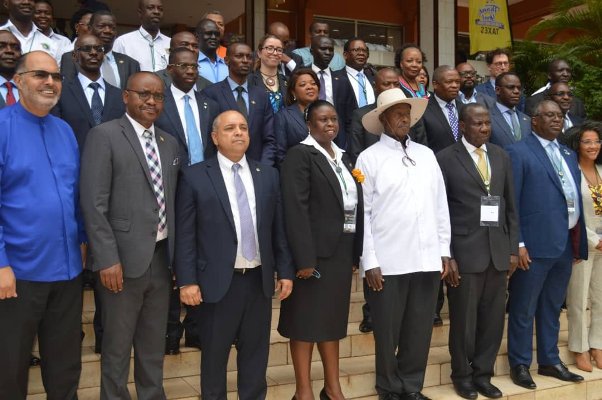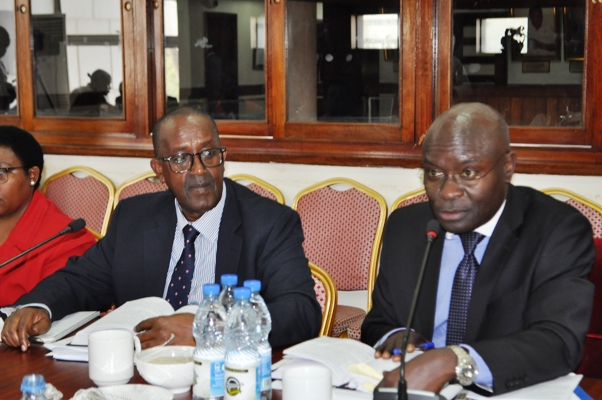The 4th International Conference on Tax (ICTA) in Africa was held in Kampala from 18th to 22nd November, hosted by Uganda Revenue Authority (URA), at Kampala Serena Hotel.
It was a pleasure to host such a prestigious conference.
The meeting attracted 48 Countries of which 37 are from Africa, with representation by over 450 participants from Ministries of Finance, African Tax Administrations, Members of Parliament, Civil Society, UN, OECD, IMF, WBG, Development Partners, Captains of Industry, media practitioners and other key partners and individual tax policy experts.
During the 4th ICTA, African Tax Administration Forum (ATAF) also celebrated its 10th Anniversary, reflecting on the past decade and future plans of the organisation in assisting African countries to boost Domestic Revenue Mobilisation efforts.
Considering the fast global trends in adopting and usage of technology, the ICTA was centred on the theme “Innovation- Digitalisation and Harnessing Technology to improve Tax systems”.
This theme came at a time when the world, Africa in particular, is grappling with challenges on how to incorporate taxation of digital economies.
Most African tax policies require a business to have a physical address in order to qualify for tax assessment.
However, this is a quality that is not akin to most online businesses. Most of them are based outside Africa but offer services and get paid by people from across the world.
The key conference purpose was to deliberate on how Africa can contribute to the current global debate on new taxing rights, to ensure African countries benefit from the new global tax rules that are expected to be agreed upon in 2020, and also to discuss how African tax administrations can harness technology to improve tax systems.
The big debate centred on challenges and opportunities for taxation in areas of 4th Industrial revolution; taxing rights in the digital era; impact of digitalisation
on VAT; business perspectives on taxation in e-commerce; and the global tax debate on digitalisation.
Some of the outstanding conference outcomes include:
• Africa needs to develop capacities and strongly implement the Exchange of Information (as a knowledge sharing platform) because the world is highly digital, which requires revenue officials to be equipped and measure up to e-commerce dynamics.
• The conference participants called for the need to go back to the drawing board and move away from just being enforcers and collectors of revenue and become a player in the digital economy in order to create strategies that fit within digitalisation.
• Policymakers at Finance Ministries must work together with tax administration officials to timely respond to the critical improvements required in domestic laws, tax treaties provisions, limited technical abilities, ineffective tax incentives and limited tax information exchange.
• African countries should look beyond self-interests, and work together on the challenge of taxing the digital economy, by seeing this as a common concern. In this regard, it was agreed that ATAF ought to play a vital role in supporting member countries by providing requisite technical assistance and support.
• Additionally, it was observed, that African countries ought to be aware that large multinationals will protect their interests over ethical considerations; therefore, tax administration should prepare for a new wave of tax evasion tactics by investing in building the capacity of their organisations in terms of technology, people skills and data analytics
• African countries should actively work on mandates for organisations such as ATAF that push their agenda in global debates because the international frameworks designed at global meetings do not usually fit into African economies.
• Digital transactions present opportunities for tax administrations to use technology to improve service delivery, encourage voluntary compliance and improve tax compliance. Participants urged African countries to embrace new technologies of the 4th Industrial Revolution, such as block chain, which enhances trust, and artificial intelligence by exploring how these technologies can assist tax administrations to operate efficiently and effectively
• As countries introduced VAT, revenue shot up and immediately went down as a result of more significant trading through e-commerce, which existing VAT legislation had not previously foreseen. While e-commerce has resulted in decreased VAT revenue collections, it has provided authorities with an opportunity to enhance the audit trail through the use of data-driven methodologies. It was, therefore, up to tax administrations to take
advantage of this opportunity to strengthen audit capabilities, mainly where countries are willing to procure effective systems
• As a result of the various changes in policy and law brought about by digitisation, participants called on African governments and tax administrations to improve engagement with the private sector. They are essential stakeholders in the tax collection process, and their involvement provides policymakers with a business perspective of the issues which is invaluable to policy design.
• African countries to embrace technology regarding Data Analytics, as it provides an opportunity for tax administrations to gain better insights into the operations of taxpayers and have a clear strategy regarding Data Analytics
The African Tax Outlook (ATO) 2019 was launched during the 4th ICTA. It examines and analyses revenue statistics from 34 African tax administrations. In addition, the conference witnessed the launch of the first VAT Technical Assistance guidelines for the construction industry and the signing of an MoU between ATAF and Sierra Leone Revenue authority for technical assistance.
In conclusion, digitalisation not only makes tax administration efficient but also addresses concerns around integrity and transparency. It additionally brings real time data for revenue compliance and tax analysis.

However, there is need to remain cognizant of the psychological human behaviour behind the big data that we get through use of technologies. This will retain a human face to tax administration in the digital economy.
As Uganda Revenue Authority, we support the resolutions from the gathering and look forward to working with other African countries as we harness technology to improve Tax systems.
By Ian M. Rumanyika, Ag. Assistant Commissioner Public and Corporate Affairs at Uganda Revenue Authority





